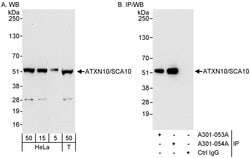Learn More
ATXN10/SCA10 Rabbit anti-Human, Polyclonal, Bethyl Laboratories

Description
The recommended shelf life for this product is 1 year from date of receipt. Based on 100% sequence identity, this antibody is predicted to react with Orangutan
Specifications
Specifications
| Antigen | ATXN10/SCA10 |
| Applications | Immunoprecipitation, Western Blot |
| Classification | Polyclonal |
| Concentration | 0.2 mg/ml |
| Conjugate | Unconjugated |
| Formulation | TBS with 0.1% BSA and 0.09% sodium azide |
| Gene | ATXN10 |
| Gene Accession No. | Q9UBB4 |
| Gene Alias | E46L, HUMEEP, SCA10, ataxin-10, brain protein E46 homolog, spinocerebellar ataxia type 10 protein |
| Gene Symbols | ATXN10 |
| Show More |
By clicking Submit, you acknowledge that you may be contacted by Fisher Scientific in regards to the feedback you have provided in this form. We will not share your information for any other purposes. All contact information provided shall also be maintained in accordance with our Privacy Policy.


